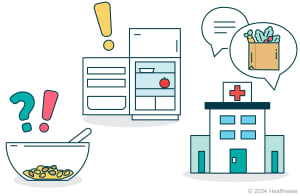Our Health Library information does not replace the advice of a doctor. Please be advised that this information is made available to assist our patients to learn more about their health. Our providers may not see and/or treat all topics found herein.
Topic Contents
Getting Help With Food
Many people need help getting food. They may live in an area where there are few grocery stores and where food costs a lot. Or they may not have enough income to buy food and pay the bills. It can also be for many other reasons, such as an illness, a job loss, a growing family, or going to college.

Worrying about getting food can be stressful. If you need help getting food, talk to your doctor, a social worker, or a faith leader. They can connect you to local resources.

You can also find help by going online to findhelp.org or to benefits.gov or to 211.org or by calling 211.
Where can you get help?
The programs that offer food will depend on where you live. And you may need to give some information to help you qualify, such as your income, your age, or if you have refugee status. To find out more about a program, try looking it up online or asking at your local library. Here are some other tips and online resources.

Food banks, food pantries, and soup kitchens.
These places give out free food or meals.
- feedingamerica.org
- foodfinder.us

Supplemental Nutrition Assistance Program (SNAP).
It gives you a debit (EBT) card to buy certain foods. Your local SNAP office can help you apply.
- fns.usda.gov/snap/state-directory

Double Up Food Bucks.
If you use SNAP, you may be able to get free fruit and vegetables from farmers markets.
- doubleupamerica.org

National food programs for children.
These include the National School Lunch Program and School Breakfast Program. Ask your child's school counselor about these programs.
- usa.gov/school-meals

Home food delivery.
Many communities have programs that deliver free or low-cost meals to people who have a hard time cooking or shopping for food.
- mealsonwheelsamerica.org

Commodity Supplemental Food Program.
It gives out monthly boxes of food to older people who qualify.
- fns.usda.gov/csfp

Seniors Farmers Market Nutrition Program.
It provides older people with coupons for fruit and vegetables from farmers markets.
- fns.usda.gov/sfmnp

Food Distribution Program on Indian Reservations.
It gives out monthly boxes of food. It's mostly for people living on American Indian reservations or for Native Americans living in certain areas near reservations.
- usa.gov/native-american-food-programs

Veteran Health Administration Food Security Office.
It connects veterans to food programs, like SNAP.
- nutrition.va.gov/Food_Insecurity.asp

Special Supplemental Nutrition Program for Women, Infants, and Children (WIC).
It gives you a debit card to buy certain foods. It's for people who are pregnant, are breastfeeding, or have children under 5 years old.
- fns.usda.gov/wic/program-contacts

Farmers Market Nutrition Program.
It provides people who have WIC with coupons to use at farmers markets or roadside stands.
- fns.usda.gov/fns-contacts

Disaster Supplemental Nutrition Assistance Program (D-SNAP).
If you've recently been through a natural disaster, you may be able to get a debit card to buy certain foods.
- disasterassistance.gov

Food programs for people who are refugees or immigrants.
You may qualify for a national food program like SNAP, WIC, or school meals.
- fns.usda.gov/non-citizen-communities
Credits
Current as of: October 24, 2024
Author: Ignite Healthwise, LLC Staff
Clinical Review Board
All Ignite Healthwise, LLC education is reviewed by a team that includes physicians, nurses, advanced practitioners, registered dieticians, and other healthcare professionals.
Current as of: October 24, 2024
Author: Ignite Healthwise, LLC Staff
Clinical Review Board
All Ignite Healthwise, LLC education is reviewed by a team that includes physicians, nurses, advanced practitioners, registered dieticians, and other healthcare professionals.
This information does not replace the advice of a doctor. Ignite Healthwise, LLC disclaims any warranty or liability for your use of this information. Your use of this information means that you agree to the Terms of Use and Privacy Policy. Learn how we develop our content.
To learn more about Ignite Healthwise, LLC, visit webmdignite.com.
© 2024-2025 Ignite Healthwise, LLC.



